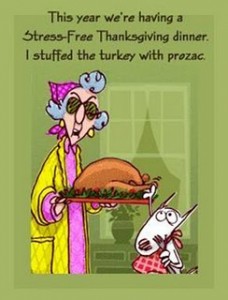Category: Uncategorized
Thanksgiving Wishes
First a bit of holiday humor
Then—for those interested in some of “bumps turned to blessings” this writer is thankful for—a link to my post on that subject over at From the Write Angle. Just want to add that I am tremendously thankful for those of you who visit this space, and particularly those who occasionally leave me a thought provoking comment.
Happy Thanksgiving!!!
When Authors Become Spammers They Waste Readers’ Social Media Time (and Their Own)
You know what drives me crazy (currently)? How much of what passes for author interaction at social media sites these days resembles spam.
I made the connection while clearing out the spam comments at this blog. They almost all start out the same, with a sentence that looks like the writer (probably a bot) might actually have read my blog post—“I enjoyed this post. This topic is really very interesting. . .”—then they turn into self-serving sales drivel. While I was gleefully emptying the spam folder it occurred to me that I’ve been seeing lots of this same sort of “let me say a polite thing about you so I can talk about ME, ME, ME” stuff on twitter, in on-line writing groups, and on facebook lately.
Frankly, it’s cheesing me off.
It’s gotten particularly bad in writing and reading related facebook groups. When I join a group devoted to say “Lovers of Mysteries with Dogs as Their Main Character” (okay I made that one up, but I don’t want to point fingers at actual groups or communities) I expect folks therein to share information on good books with doggy detectives, or links to websites to help me in researching or writing same. Instead what I am getting these days are nearly naked advertisements—“My book ‘It’s a Dog Eat Dog World’ just got a super-duper review at ‘Dog books R us!’ Read it here. Or better still buy my book here, or here, or here.” This is just annoying. If I want advertisements there are plenty running along the top or side of every darn website I visit. “Come on fellow writers,” I want to scream, “you’ve got a personal facebook page, probably an author FB page, and doubtless an author website to share good reviews and ‘buy it now’ links.” The essence of communities and/or shared-interest groups (like FB “bookclub” pages) is dialogue—even in the virtual world.
A hybrid of “boast posters” are the folks who share EVERY blog post they’ve ever written or will ever write to a facebook group, or to twitter, irrespective of whether it’s on topic. Sure, if someone has written a post that is germane to the topic of a group or comment thread (or touches on one of the subjects that they assume people follow them on twitter to hear about) then posting that link is a worthy public service. But if a blogger is just slapping up everything he can think of to increase his name recognition then he should spare us and save himself the time (because pretty soon I for one am going to stop looking at his posts because I already KNOW what they will say – some version of “look at me.”)
As a writer I understand where this behavior has its roots. There is a great deal of pressure on writers today to market our own work, and very specifically to have a presence in the virtual world. If writers join any community of like-minded people as part of “building an internet presence,” however, I firmly believe they should try to interact in a genuine, non-agenda-driven, manner. And just for the record the interaction is neither effective nor genuine when it amounts to commenting on topics started by others in true spam form (“I am fascinated by cocker spaniels but for a really great blog on poodles, more specifically MY poodles, click here”). I think spam-types fail to recognize a basic truth – all on-line presence is NOT equal and, specifically, an annoying presence seldom sells a book.
If you are a spammer not a genuine community member you are wasting your time—at least as far as I am concerned. Because the truth is, when I have my “reader hat” on, I buy two kinds of books: 1) those receiving notable reviews or buzz from reviewers I trust (whether that’s a “R”eviewer in the print or digital media or a guy I sit next to on the bus every morning and discuss books with); and 2) books written by friends (folks I’ve gotten to know through writers conferences, through on-line communities and through their blogs). You are no friend of mine if you spam me.
Readers, what do you think? When you join a “readers” or “lovers” group on line (as in “mystery lovers” that was NOT meant to be an X-rated comment) do you expect to encounter posts/comments that are nakedly self promotional? When you do see them do they bother you or do you merely consider it a convenient way to discover new books in a particular genre? Am I must imagining a sudden spike in such spam-like posts (after all I am a writer and I do have an overactive imagination), or have you noticed a similar phenomenon?
World Humanitarian Day 2011
Today is world humanitarian day. Please join me in celebrating those who devote their energies and their lives to people most of the world prefers to forget.
Celebrating Georgette Heyer’s Natal Day with Deals on Her Books for Fans
Tomorrow would have been Georgette Heyer’s 109th Birthday. Ms. Heyer’s books introduced many readers to regency romances and she is considered by many to be the Queen of that genre. To celebrate her natal day her current publisher, Sourcebooks, is offering every single Heyer title in e-book format for only $1.99 each. The offer is good beginning today and ending on August 21st. Heyer fans enjoy!
Up Close and Personal (sorry for the coffee breath)
As those of you who follow me on twitter know, I learned a lot at 4th North American Historical Novel Society Conference in San Diego last month (see—I didn’t just spend my time drinking in the hotel lobby). I even had a number of “ah ha” moments.
One of those happened early on, when a publishing industry insider said, “The author to reader connection is closer than it has ever been.” Now admittedly this was a bit more of a “duh” moment than an “ah ha” moment as it was happening because if there is one thing a writer knows (even a newbie like me) it’s that in this era of social-media we are expected to network with our potential readers. But knowing something being able to act on it effectively isn’t always the same thing.
What does it mean to “be accessible to our readers?” How can we turn the monologue (I blog, I tweet, I facebook, therefore I am) into a dialogue? How can I improve your experience—of this website and ultimately of my book?
It was while thinking about these questions that the “ah ha” bit happened (or more precisely while thinking about these questions and not coming up with any clever answers) —ask readers. AH HA!!!
So, what do you think? What would you like to read about here in blog-land? What do you like about this place and what needs some improving? Do you follow me on twitter, and, if so, how would you whip @lit_gal into shape if you were given access to a whip? What can I or should I be doing to improve your experience as a reader (of this blog and soon, I hope, of The Sister Queens)?
Give Me A Little Kiss – Sex and the Historical Novelist
There is nothing new about sex. Birds do it, bees do it, and our ancestors most certainly did it (to butcher Cole Porter’s lyrics inexcusably).
What IS relatively new is the amount of sex appearing in “straight” historical fiction (I use this term to distinguish historical fiction from historical romance, not to imply that only heterosexual hanky-panky is included). If memory serves, the historical novels of my youth did a lot of fading-to-black. But somewhere between my decision to become a writer and my first book deal a shift occurred. Today there are plenty of sex scenes in straight historicals—some of them quite explicit. And sex seems to be a popular addition. For example, a video recorded at this year’s Historical Novel Society Conference during a popular event called “Late-Night Sex Scene Readings” (the reading of a scene from Gillian Bagwell’s The Darling Strumpet) has received over 6,000 hits on youtube since June.
Opinions on this trend vary. Here is mine: the inclusion of sex in historical novels is neither good nor bad in a vacuum. It’s not the sexual content that determines whether a particular scene works—it’s whether that scene (sex or otherwise) has a REASON for being in the novel. Tossing in an orgy (or even a kiss) into your work of historical fiction without a solid reason is a bad idea. The scene will feel “added on,” and gratuitous sex is no more acceptable in a novel than gratuitous dialogue.
So what can intimate scenes sometimes do well?
Forward the plot. Yep, just like any other sort of action a sex scene can move a novel’s plot forward. For example, one of my manuscripts includes the seduction of a royal courier for the purpose of getting a letter into his satchel. This letter is an important step on the path to the book’s central climax. So the sex scene (in a stable and pretty exciting in its own right, I might add) is vital to the forward motion of the novel.
Flesh out (sorry, I just HAD to) relationships between characters and/or give us emotional insights into characters. Sex, as we know from real life (or at least some of us know – no pressure on or disrespect to celibates reading this), is seldom merely a physical act. It has emotional ramifications, and can be a language all its own. So, a sex scene in a novel (whether vague or graphic) can be effectively used to give readers a sense of how characters relate to each other. For example, in my debut novel, The Sister Queens, readers learn a tremendous amount about one of my female characters and her relationships with two separate men simply by the contrast between her sexual experiences with each.
Help set the story firmly in its historical period. Sexual politics, mores, and practices change over time. For example, in certain periods, a man’s dominion over his wife’s body was complete – there was no such thing as rape between a man and his wife. Likewise, for hundreds of years sex (seduction, withholding of, etc) was one of the few tools available to a woman seeking power or influence. While today we would surely condemn a man for taking his wife by force and likely censure a woman for using sex to get ahead, seeing either such event a depicted in a historical novel reminds readers of the realities of the past and of our characters’ lives.
Beyond raising large issues of this sort, the inclusion of period details pertaining to sex—the acceptable positions for intercourse, its prohibition on certain days, the forms of birth control that were or were not available—can help build the “historical world” of the novel just as the inclusion of other period details can. In my novel frequent reference is made to payment of the “marriage debt,” and one of my female protagonists feels wronged when her husband spurns intercourse with her. As a matter of history she was entitled to feel gypped because, under the doctrine of the medieval Church, a married man was obliged, under penalty of mortal sin, to give his wife sex as a preventative measure against temptation to sins like fornication and adultery.
Give the reader a thrill. Yep, this one is legitimate too. But wait, Sophie, you are thinking, “you wrote five paragraphs ago that gratuitous sex is not acceptable.” Since when, dear writer, is giving the reader a bit of fun gratuitous? Meeting the needs of the reader is our business. We meet needs for escape. We meet emotional needs. We help readers wrestle with difficult questions in their lives. For heaven’s sake why should meeting readers’ needs for a bit of titillation be off the table? And why should meeting that need be solely the province of historical romance? Plenty of contemporary novels—from thrillers to literary fiction—include sex. I believe that writers working anywhere along the historical genre continuum should feel free to include intimate moments as well.
What do you think? Would you prefer to see explicit sex kept for historical romances alone? Can the inclusion of sex in a straight historical novels can be a positive addition?
Confessions of an Alpha Female – In Which My Sister Points Out What Should Have Been Obvious
So, we are getting my son a puppy. My son is the shy type and likes constant companionship so a dog seems like a perfect fit. A boy and his dog. . .you know the stories (not Where the Red Fern Grows or stories like that—the HAPPY stories).
I phoned my sister to tell her the news.
“This is going to be his dog right?” she asked. I sensed a certain skepticism. Perhaps she didn’t think he could handle a dog at nine-years of age.
“Oh yes, we’ve talked about the responsibilities,” I babbled. “He helped select the breed and we picked an ultimate people dog, a Cavalier King Charles Spaniel.”
“You’re missing my point,” she replied somewhat impatiently. “How are you going to keep the dog from bonding with YOU? You are such an Alpha. You had better line up a trainer before the puppy even arrives.”
Wow. ‘A trainer for who?’ I was tempted to ask. My son, the puppy, or me? But the question would have been facetious. As soon as the words were out of her mouth and bouncing off the satellite to my mobile phone I knew exactly what my sister meant, and was left wondering why I didn’t see it before. I am a very “in charge” person. Dogs are attracted to dominant people. . If this dog is really going to be my son’s dog we will need some advice on how to get it to bond with my son and see him as the pack leader.
No. I am not going to continue blogging about dogs. I am going to blog about sisters. Because what this story really illustrates (you were wondering, admit it) is one of the driving themes behind my novel, The Sister Queens—our sisters act as mirrors for us; when we forget who we are or when we fool ourselves into thinking we are something we are not, they call us on it. Continue reading Confessions of an Alpha Female – In Which My Sister Points Out What Should Have Been Obvious
Invention is the Midwife of Good Historical Fiction
Necessity may be the mother of invention, but invention is the midwife of good historical fiction.
Invention and creativity are good things. But in historical fiction we (writers) sometimes lose sight of that, and get bogged down in the minutiae of our period and the thousand little details in our characters’ lives. I was recently reminded, with force, that readers come to authors of historical fiction for something more than a collection of facts.
I had the opportunity to hear Susan Vreeland, a master of the genre, speak at a recent Historical Novel Society Conference. I thought Susan was going to do a presentation on her latest book. But, when we were gathered before her in our neat little rows, she decided to tackle a larger issue – the role of invention in historical fiction.
“Don’t be tyrannized by fact.” That’s how Susan opened her presentation. And she is right of course. Historical fiction is not academic history. Does accuracy matter in historical novels? You bet your farthingale it does but, “fictional art can show truth that goes deeper than a collection of fact; it can show us what it felt like to be a particular person at a particular time” (again, Susan V). Besides, “as soon as something happens people start lying about it” (Cecelia Holland) so “truth” in history can legitimately be debated.
Susan pointed out that selection (and correspondingly, elimination) of facts is part of the process of writing compelling historical fiction. Good authors know instinctively – whether they write historical fiction or another genre – that telling just the right bits is what gives a great story its focus. Authors of historical novels must choose only those events from history that relate to the specific premise/themes of their particular novel. It doesn’t matter how interesting an event is (or how pivotal it is in the life of a historical character), if that event doesn’t forward the plot of the book an author is writing, then it needs to be left out. There were dozens of interesting events in the lives of my main characters, Marguerite and Eleanor of Provence, during the twenty-year period covered by The Sister Queens that did not make it into my novel because they were not germane to the “sisters” theme of my book. Continue reading Invention is the Midwife of Good Historical Fiction
Just DO It!
I am a long time member and BIG time fan of AgentQuery Connect. For those aspiring writers who do not know AQ run don’t walk to the website as it is a fantastic source for information on every step of the road to being repped and published, a very supportive writing community, and (most importantly for the purposes of this post) good spot to get feedback on a query letter before you send one out.
Now anyone who’s ever drafted a query letter (the pitch letter writers send to agents) knows it takes time. The letter is a vital sales document. Write it well and you snag the interest of an agent and a coveted request for a partial or full. Write it poorly and you may never even warrant a form rejection. Writing a good query is not easy (there are hundreds if not thousands of articles and blog posts offering advice on how to compose a good letter). BUT should it really take months and drafts in the double-digits?
At the risk of aggravating many I say no. In fact I say, NO, NO, NO. What I’ve noticed, watching query critique threads over the months and years, is that writers become paralyzed by fear and good intentions. Writing their query becomes a Sisyphean struggle (you remember, the guy who had to push the big rock up the hill over and over) and in the process time, enthusiasm and confidence can be lost. At some point the incremental improvements their letter is arguably making are not worth the agony. More than this, letters can lose voice (see my post on this topic at From the Write Angle). Looking at critique threads with ten, twenty, thirty, even fifty versions of a single query, I want to scream GET ON WITH IT, or SEND THE DARN THING. But that kind of verbiage in individual critique threads would hardly be appropriate.
So I am saying it here. Just DO it. Query.  I am not saying send your first draft. I am not saying don’t seek critique. I am saying all things in moderation. How many drafts of my letter did I do – maybe four. How many people did I show it to for review before it went out? Five (and two of them weren’t even writers). Did it work? More than uncommonly well (I had a very high request rate, snagged an agent I adore and now have a publishing contract). Could my letter have been better? Sure. But if I were still working on polishing it, then my book wouldn’t be coming out in March 2012 would it?
I am not saying send your first draft. I am not saying don’t seek critique. I am saying all things in moderation. How many drafts of my letter did I do – maybe four. How many people did I show it to for review before it went out? Five (and two of them weren’t even writers). Did it work? More than uncommonly well (I had a very high request rate, snagged an agent I adore and now have a publishing contract). Could my letter have been better? Sure. But if I were still working on polishing it, then my book wouldn’t be coming out in March 2012 would it?
Not THAT Sophie (Tales from the “Writer’s Life”)
The discovery that my forthcoming historical novel, The Sister Queens, had appeared on Amazon for pre-order was magic – magic with a little “humbling experience” tacked on for good measure.
I was ecstatic when a friend told me that my book was listed. Here was proof indeed that I had not imagined the whole “book deal thing.” Ha, I thought, let’s see NAL wiggle out of this now. But my enjoyment soon led to a sober realization – you are only as good as your sales and rankings. I may have a book listed on Amazon (and IndiBound and Books a Million. . .) but I am NOT a household name. I am not even close.
What, you may ask, brought this fact home to me? To paraphrase Pixar’s marvelous Toy Story, “a child’s plaything.” You see I am NOT the first “Sophie” Amazon suggests when one goes to the search window and begins to type. Doing this (when I should have been researching my next work of historical fiction) I discovered that when I get to “p” (s-o-p) Amazon kindly suggests another Sophie – obviously a sales-super-star – “Sophie the Giraffe.” I was not familiar with Ms. Giraffe before this, or with her body of work. Sophie the Giraffe is a teether, as in infants gum her with vigor, drop her on the floor and then squeal impatiently until she is returned to their grasp. I have included a picture of Sophie G so you can appreciate her magnificence.
Coming behind a rubber toy in a “suggested search” list is a humbling experience. But when I looked more closely at Sophie G, I realized I could learn a thing or two. Sophie is NUMBER ONE in the Amazon “Baby” bestseller rankings (we will not discuss how far from number one I am on any list presently). She gets an average of 4.5 stars from reviewers. And she is able to command some serious cash for a figure only 7” tall. In fact, a single giraffe teether costs $7.00 more than a copy of my novel. Wow (hint to readers, buy the book – I don’t care if you chew on it).
Sophie G is obviously doing something right. Here’s what I think.
Continue reading Not THAT Sophie (Tales from the “Writer’s Life”)
